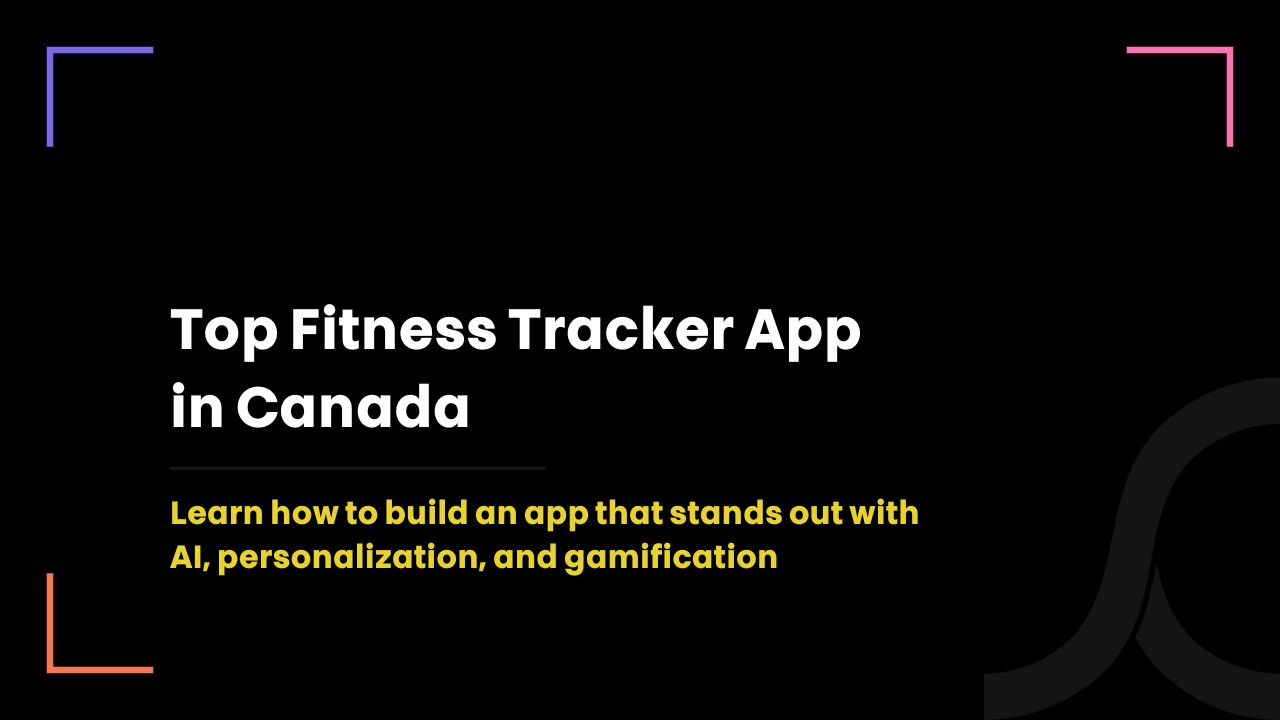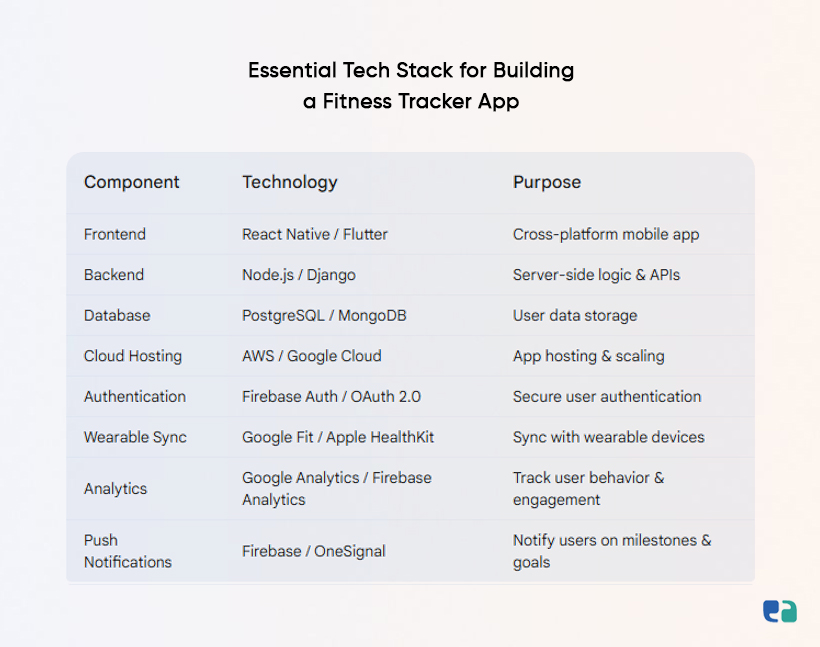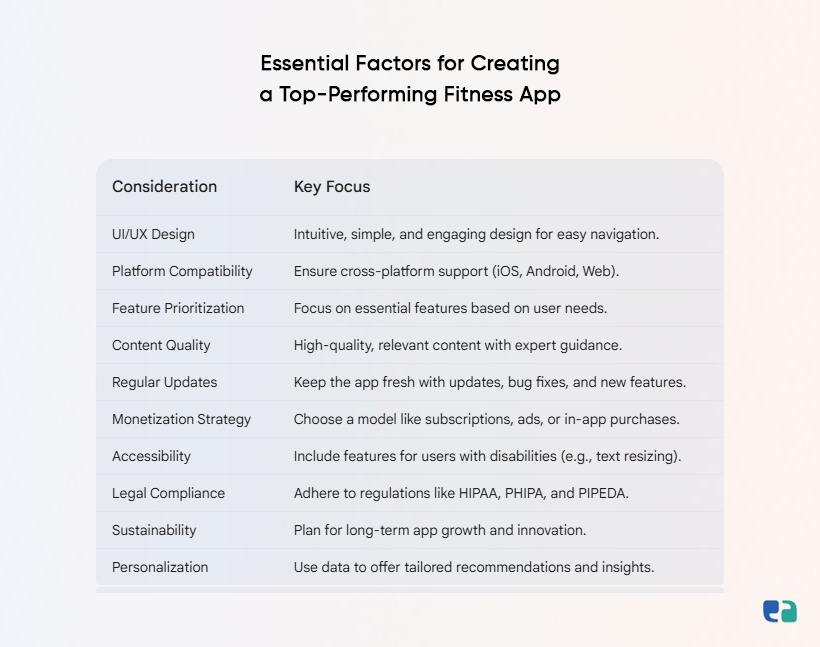Fitness Tracker App Development: Top Apps, Key Features, and Emerging Technologies

2 months ago
The New Year has knocked on the door, and gyms are getting crowded.
With each passing year, the need for good fitness is increasing.
But going to the gym is not enough.
Most Canadians are also trying different fitness products to achieve their maximum goals.
One of these products is a fitness app.
And it’s not just us—statistics show the same trend.
The fitness app market is expected to grow to over $56 billion by 2030!
Some amazing apps like Zing Coach and RunMotion are leading the way by delivering more personalized fitness experiences.
Their AI features offer:
- Custom workouts
- Nutritional tips
- Progress tracking insights
For health-tech entrepreneurs, this is the most lucrative field to build a startup.
You're not alone. We’ll help you build a successful fitness tracker app—just follow us.
Fitness Tracking App Market in Canada
Avoid Building a General App; Focus on Your Niche
There are thousands of fitness tracking apps, and most of them offer general services.
But if you want to stand out, focus on your niche. What kind of specialized service do you want to provide?
Here, we are sharing some popular fitness app ideas you can draw inspiration from.
1. AI-Powered Fitness Apps
Zing Coach incorporates AI in their application to track body composition and vital signs.
Based on that data, it prepares personalized workouts.
The same with RunMotion. It adjusts running plans to match your fitness level and goals. It also has a chatbot to resolve quick queries and keep you motivated.

2. One-on-One Fitness Apps
Every gym member wants to have a personal session with the trainer, and the app Flexit provides the same with its digital experience.
It gives one-on-one digital sessions with certified personal trainers.
That’s not all.
The personal coach also provides custom training plans and on-call support.

3. Meditation and Mindfulness Apps
Mental well-being is just as important as physical fitness.
As mental health is attracting attention from all, the need for meditation apps is increasing.
Apps like InsightTimer offer tons of guided meditations people love.
Another app, Aura, provides personalized recommendations to match your specific needs.
These are recommended apps for mental and emotional well-being.

4. Diet and Nutrition Apps
The core of any fitness plan is the kind of food one is consuming.
There are some diet and nutrition apps, like ZOE, that provide personalized nutrition advice.
ZOE offers these impactful recommendations based on a person's unique biological data and gut health.

5. Connected Fitness Apps
Want a gym at home?
Then you need to download the Kabata App.
Its AI-powered dumbbells track your performance and adjust your workouts in real-time.
Another application, Vitruvian, offers a smart resistance platform that combines guided workouts with performance tracking.
6. Physical Therapy Apps
hysical therapists are also using digital mediums to reach their customers.
One big name in this is Trak.Physio.
This app connects users with remote therapists. It’s a great app for progress tracking and personalized exercise plans.
Kins App offers physical therapy to patients who are remote and want affordable treatment.
7. Social Fitness Apps
Gymming with friends is the best fun experience.
And FITFCK is making it possible.
A combination of fitness and social, this app connects gym-goers with like-minded people.
GoJoe mobile app takes this idea to corporate employees. It motivates employees and encourages team fitness challenges.
Top Features You Should Include in Your Fitness Tracker App
Here are the major features that should be at the heart of your app:
1. Activity Tracking (Steps, Distance, Calories Burned)
Tracking is the core of every fitness app. It motivates users to move a little extra, and they want to see their achievements.
Make sure your app tracks:
- Steps
- Distance
- Calories burned
Let them understand their daily activity level.
2. Workout Logging (Type, Duration, Intensity)
Users also need to log their workouts. Whether it’s:
- Running
- Weightlifting
- Yoga
An innovative fitness feature is to track progress over time and let them make changes to their routine as needed.
3. Goal Setting and Progress Tracking
Setting goals is vital to staying motivated.
Your app should let users set their goals (like steps per day or weight loss) and track their progress. This feaute keeps them on track and motivated.
4. Sleep Monitoring: Good sleep is vital for fitness
Quality sleep is the key to good productivity. If you can track it, you can improve it.
Make sure you incorporate a sleep monitoring feature to improve users' rest and recovery.
5. Nutrition Logging and Guidance
Nutrition is as important as the exercise you do.
Build an app that:
- Logs their food
- Tracks calories
- Gives personalized recommendations
Include these apps based on the niche service you want to offer through your app.

Boost User Engagement & Motivation with Smart Features in Your Fitness Tracker App
1. Personalization: Tailored Workout Plans and Recommendations
The more personalized support your app provides, the more it will appeal.
You can incorporate AI to create custom workout plans.
Such apps understand individual goals and preferences and give personalized recommendations.
There is an app like FitnessAI, which uses artificial intelligence to:
- Adjust workouts
- Make users feel supported
- Help them stick to their fitness journey
2. Gamification: Challenges, Rewards, Leaderboards
Mixing fitness with gaming is the deadly combination everyone wants.
Remember the days when we used to play a lot and most of our exercising was covered in it?
Similarly, include this gamification feature in your fitness app and give challenges and rewards to your users.
FitPic App has been doing it for a long time. It lets users:
- Join team challenges
- Track progress
- Share achievements with friends
3. Social Features: Connect with Friends and a Supportive Community
This is a different kind of social media that boosts health.
Yes, we are talking about apps like Nike+Fuel, which mix social media with fitness.
These apps create an environment where users can track progress, compete, and cheer each other on.
4. Integration with Wearable Devices: Seamless Data Synchronization
Whether it’s an Apple watch or any other smartwatch, all are becoming the favorite tools of Gen-Z to track their health.
Make sure your app integrates with such smartwatches and fetches all the data, including activity, sleep, and workouts.
And give a complete picture of users' health.


4 Simple Steps to Build a Fitness Tracker App
Here’s a simple guide to creating a fitness app that stands out:
1. Validate Your Idea & Research
Go to the core of your app. Who will be its target audience? And how can you stand out in this crowded market?
The more you research existing apps, their business models, and market competition, the better app you will build.
2. Wireframing & Design
Once you know your audience and effective features, move on to wireframing.
This gives you a blueprint of the app’s structure and it's flow. Focus on design to ensure a visually appealing and easy-to-use UI.
A sleek, user-friendly design is essential to keep users engaged.
3. Build an MVP (Minimum Viable Product)
Before investing money in building a custom fitness mobile app, we recommend starting with an MVP.
This is a basic version of your app and costs very little.
It launches quicker and saves time by focusing on the most important parts of the app.
It helps you gather feedback and make improvements before adding more features.

4. Get Feedback & Improve
Your app development doesn’t end with the launch.
- Collect user feedback
- Monitor how they use the app
- Adjust based on their needs
Keep updating your app based on real user feedback and make it relevant to their needs.

2 Important Considerations for Fitness Tracker App Success in Canada and Beyond
1. Data Privacy and Security: Protecting User Information
Data breaches and ransomware attacks are continuously increasing.
This threat also raises concerns about data privacy and security.
If you build a solution that is not secure enough, you're risking not just user information and penalties but also the reputation of your business.
Make sure your fitness tracking app follows all compliance regulations based on the country you're operating in.
In Canada, adherence to PIPEDA is essential, while in the U.S., HIPAA also governs how health-related data is managed.

2. Accuracy and Reliability: Ensuring Data Integrity
Fitness apps are trusted by users to track important health metrics. So the accuracy of the health data is non-negotiable.
Canadians expect precise information, especially when it comes to wearable devices integrated with the app.
It’s important to rigorously test your sensors and algorithms to ensure data reliability.
The app should also allow users to calibrate devices for better accuracy. Failure to ensure reliable data can undermine trust and may even lead to health risks.
By sticking to best practices and keeping data accuracy in check, you can improve user experience while avoiding potential legal complications from misrepresentation.

